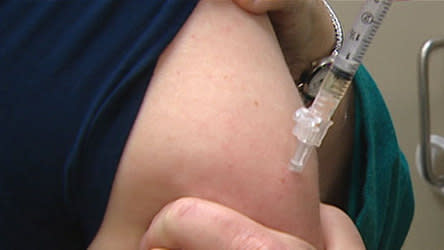 Daily Brew
Daily BrewSome adults vaccinated against measles as kids getting sick, suggesting immunity may wear off

People reading about the current flare-ups of measles cases in British Columbia and elsewhere in Canada might be thinking that their childhood vaccination probably protects them from catching the disease.
But scientists are warning they may be wrong.
People who were immunized against measles and other diseases via childhood vaccinations are getting the disease, suggesting the inoculation's effectiveness wears off over time, Postmedia News reports.
"There's sort of a ticking time bomb here: how many of these people exist, we don't know, and who they are, we can't identify them," Dr. Brian Lichty, associate professor in the division of molecular medicine at McMaster University, told Postmedia News.
[ Related: Measles alerts for Calgary, Edmonton as outbreaks continue ]
The Fraser Valley area east of Vancouver has been ground zero for the B.C. outbreak, with some 230 reported cases to date, most linked to a Christian school where families shun vaccinations for religious reasons.
At least one case showed up in Vancouver and another across the border in Washington state, both with connections to the religious group.
NPR reports the young Washington woman infected during a visit to B.C., was unaware she'd caught measles, so she went to work, out to a restaurant and to a Kings of Leon concert in Seattle, creating the potential for spreading the infection. It takes a week to 17 days for an infected person to show symptoms, NPR noted.
Other unrelated clusters have turned up in Alberta, Ontario, Saskatchewan and Manitoba, Postmedia News said. Most involved people who travelled to countries where measles is more common, including the Netherlands and the Philippines.
High vaccination rates in Canada have largely wiped out the disease, which besides its signature rash can cause serious complications, ranging from blindness to brain damage and even death.
Lichty said the vast majority of adults who were vaccinated decades ago are protected.
"That's why we haven't seen measles in industrialized countries for years, because the vaccine works very well," he told Postmedia News.
The Public Health Agency of Canada says those who've received two doses of measles vaccine are at very low risk. However, those who haven't been vaccinated run the risk of infection if they come in contact with someone who's contagious. People with weakened immune systems are also more susceptible.
[ Related: Measles outbreak underscores battle over vaccination holdouts ]
Adults born before 1970 are presumed to have acquired natural immunity to measles, according the agency's immunization guide.
But others should probably consider consulting their doctors about the need for a booster or to be vaccinated in the first place.
The agency recommends one dose of the MMR (measles, mumps and rubella) vaccine for adults born in 1970 or later, except for those at greatest risk of measles exposure, including travellers to endemic regions, health care workers and military personnel, Postmedia News said. A single dose is considered 85-95 per cent effective, while a second dose raises immunity prospects to almost 100 per cent.
"There is a concern we may need to vaccinate more — double dosing for adults as we do for children," said virologist Earl Brown, a professor emeritus at the University of Ottawa.


